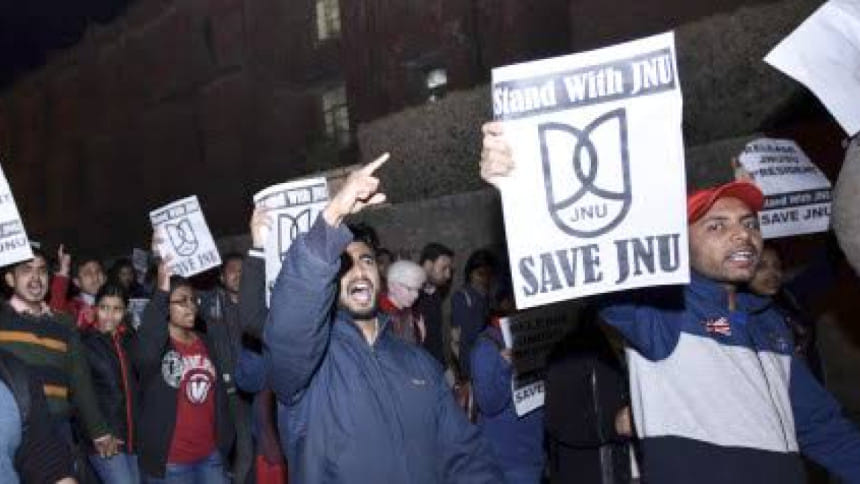Solidarity with JNU student movement

JAWAHARLAL Nehru University which is one of the best educational institutes of India, is again making news all over the country. The university, which has a huge number of students from India and all over the world, is going through a rough patch. Since its inception, the university has been responsible for the proliferation of several familiar faces, who have been upholding the image of the country in the political, economic and social arenas.
Before the recent turmoil, another issue had divided different wings of the university. A group of ex-members of the Democratic Student Union (DSU) called a meeting at the campus, protesting the hanging of the alleged mastermind of the 2001 Parliament attack, Afzal Guru. The JNU unit of Akhil Bharatiya Vidyarthi Parishad (ABVP) protested this movement, and asked concerned authorities to take appropriate actions. When the DSU members were not allowed to use microphones, they informed the JNU Student Union (JNUSU) leaders who supported them, stating that it was the right of students to protest at the campus. JNU has always been dominated by Left-wing politics, so they didn't want this issue to be controlled by a rightist group.
After the BJP government came to power in 2014, some media houses reported that JNU has always been an anti-nationalist institution. There were also accusations of students using anti-India slogans. On this issue, there were immediate actions from some political leaders of BJP. Soon after the complaint was registered, JNUSU president Kanhaiya Kumar was arrested on sedition charges. After the arrest of the JNUSU president, two opposing groups on the issue emerged in the campus. One group has the backing of officials from the central government, and this group persists on giving the institution an anti-nationalist tag. The other group, on the contrary, includes liberal students and teachers who are protesting for the freedom of expression within the campus. This group includes people with secular ideals who are united to fight for the reputation of this university. The latter was also supported by Congress leaders; Rahul Gandhi even came to the JNU campus to show solidarity with the university's student community. He stated that JNU is being targeted wrongly and by trying to crush the students, the BJP is making the JNU students stronger. Delhi Chief Minister Arvind Kejriwal is also supporting JNU as he added that BJP should have a fair trial to prove the authenticity of the accusation on Kanhaiya Kumar.
From the government side, it is being said that those who are innocent will be freed but those who are "anti-nationalists" won't be spared. With the government's "witch hunting" in place, the protest is turning into a mass movement.
First of all, we need to understand that the definition of anti-nationalist is not clear here. A group of people's demonstrations regarding something that goes against the interest of the country is actually being seen as "anti-nationalist" here. Afzal Guru, who was a convict and the leader of the Azad Kashmir Movement, cannot be celebrated as a hero. But the students of JNU were against his death penalty as he was not giving the opportunity to defend himself; they were not celebrating his martyrdom.
Whatever it may be, frightening the student group with armed forces can never be justified. Student movements all around the world have never been in vain or without cause. If the government feels that the student leaders are wrong, then there could be other ways to deal with this. Students being beaten up by lawyers in front of the court will not resolve anything; it will only strengthen their resolve and their cause. As a student of JNU, I have always witnessed peaceful demonstrations here. I had thus never expected this radical turn of events. I hope this matter will be peacefully resolved, letting go off the any political motivation that could only add fire to the flame.
The writer is an M.A. student at Jawaharlal Nehru University (JNU), New Delhi.
Email: [email protected]

 For all latest news, follow The Daily Star's Google News channel.
For all latest news, follow The Daily Star's Google News channel. 



Comments